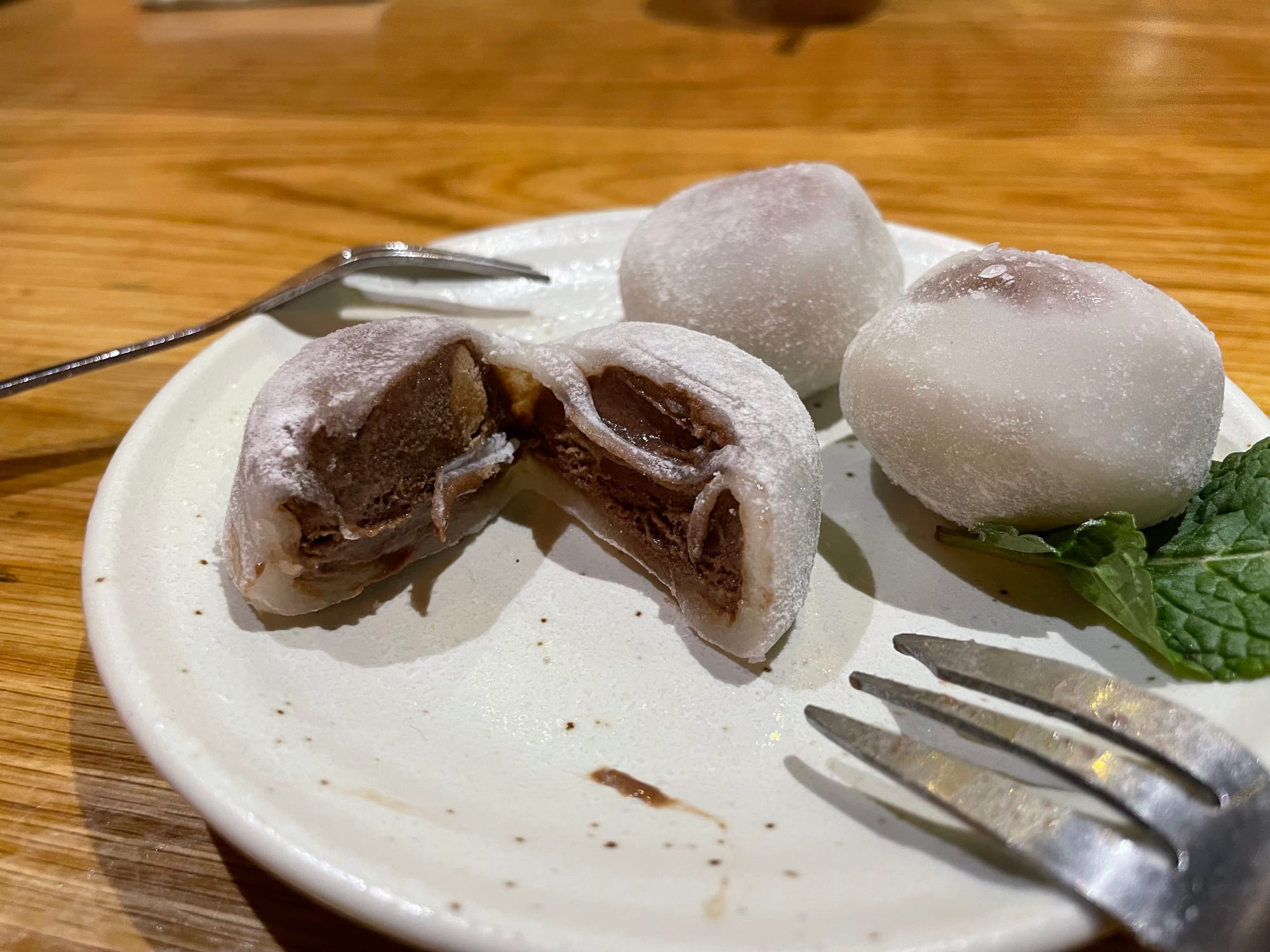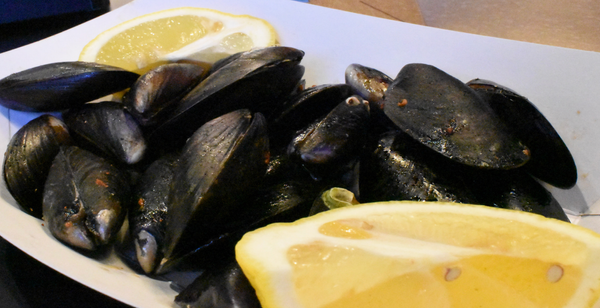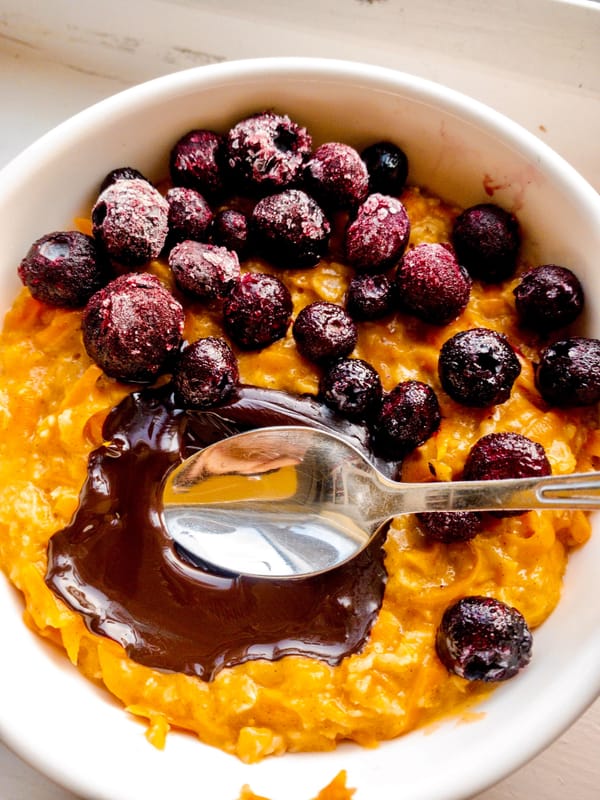Irasshaimase! - Welcome to Shoryu
In today’s segment, we will be talking about Shoryu Ramen a minimalist Japanese ramen chain restaurant that is scattered in a few spots in and around London
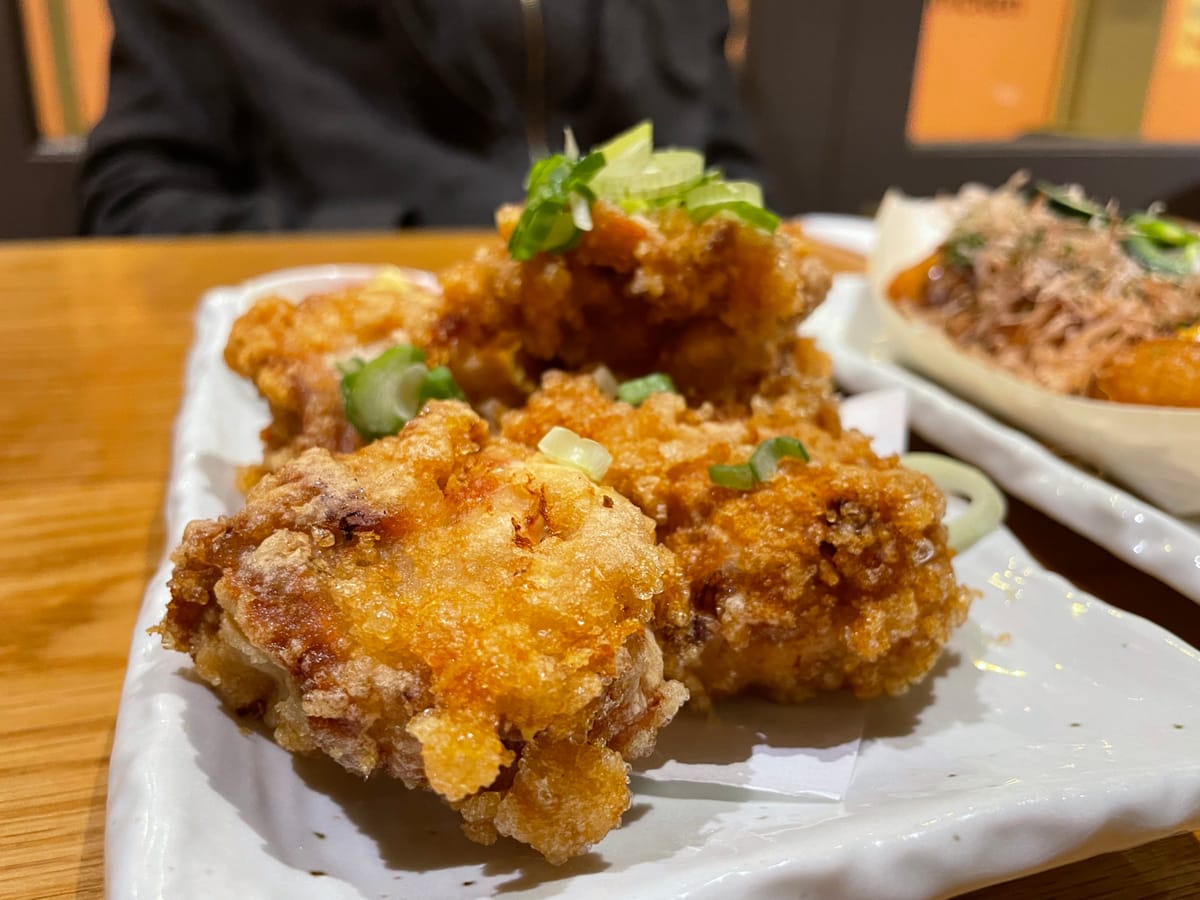
Happy new year to my beautiful mandem at Imperial, I hope everyone has had some time to rest during the winter break and xin nian kuai le to my Chinese mandem. It’s been a month since my last column, where I talked about Berenjak - a modern Persian restaurant in the heart of London. In today’s segment, we will be talking about Shoryu Ramen a minimalist Japanese ramen chain restaurant that is scattered in a few spots in and around London, such as: Regent Street, Carnaby, Liverpool Street and Shoreditch to name a few, (to see their full list please refer to their website). Shoryu Ramen specialises in Hakata tonkotsu (pork) ramen of Fukuoka city which is located in the southern island of Kyushu (one of the four main islands of Japan). The core feature of this ramen is that it is made with a thick, rich, white pork soup and thin straight ramen noodles. like all variations of ramen - what makes each ramen unique is the type of noodle being used along with the broth that accompanies such noodles. Toppings and other additives are just extras that a chef would use to express their style of cooking, knowledge and preference in order to distinguish themselves from other competitors.
Before moving onto the foods that Shoryu serves, I want to go through the brief history of ramen and what it is about, so you the reader can appreciate the food you eat even more. The Japanese word ramen originates from the Mandarin Chinese word lāmiàn (拉麵[拉面]), which means “pulled noodles”. There’s a myth that ramen was introduced to Japan during the 1660s by the Chinese neo-Confucian scholar Zhu Shunsui who served as an advisor to Tokugawa Mitsukuni after he became a refugee in Japan. However, a more plausible theory to when ramen was introduced to Japan, states that the dish was introduced in the late 19th century or early 20th century by Chinese immigrants living in Yokohama Chinatown (just south of Tokyo).
While standard versions of ramen are available throughout Japan, the last few decades have shown a proliferation of regional variations throughout the country, such as the aforementioned tonkotsu (pork bone broth) of Kyushu island called Hakata style. Another variation is Miso ramen, found in Hokkaido - the most northern island out of the four main islands. In between this geographical spectrum you have styles such as: Tokyo-style ramen which consist of slightly thin, curly noodles served in a soy-flavoured chicken broth and Kitakata style that is known for its rather thick, flat, curly noodles served in a pork and niboshi (dried sardines) broth.
Of the branches available we visited Shoryu at Carnaby, so if you do attend another branch please keep in mind that the experience may slightly vary. The location itself is very vibrant and busy at night, filled with many people on the weekends. Shoryu provides indoor and outdoor seating, where the tables inside are more spacious and the air is more warm and the outside is active and colourful, with many side-by-side restaurants and people walking around.
Shoryu offers an abundance of different ramen combinations, with your main source of protein being either pork, chicken, tofu or seafood. This gives rise to dishes such as: Chicken Katsu Curry, Kimchi Seafood Natural and Piri Piri Tonkotsu to name a few. Their most notable sides would be Takoyaki, Chicken Karaage and Hirata buns, which is a cushiony steamed bun that can include fillings such as BBQ pork, Chicken Karaage and Pumpkin Croquette. As for drinks, there is a wide selection of non-alcoholic beverages ranging from your standard coffee and soft drinks to alcoholic beverages such as wines, beers and cocktails. However, as Shoryu is a Japanese restaurant, they put a big emphasis (rightfully so) on the Japanese alcoholic beverages like Sake, Japanese whiskey, and teas.
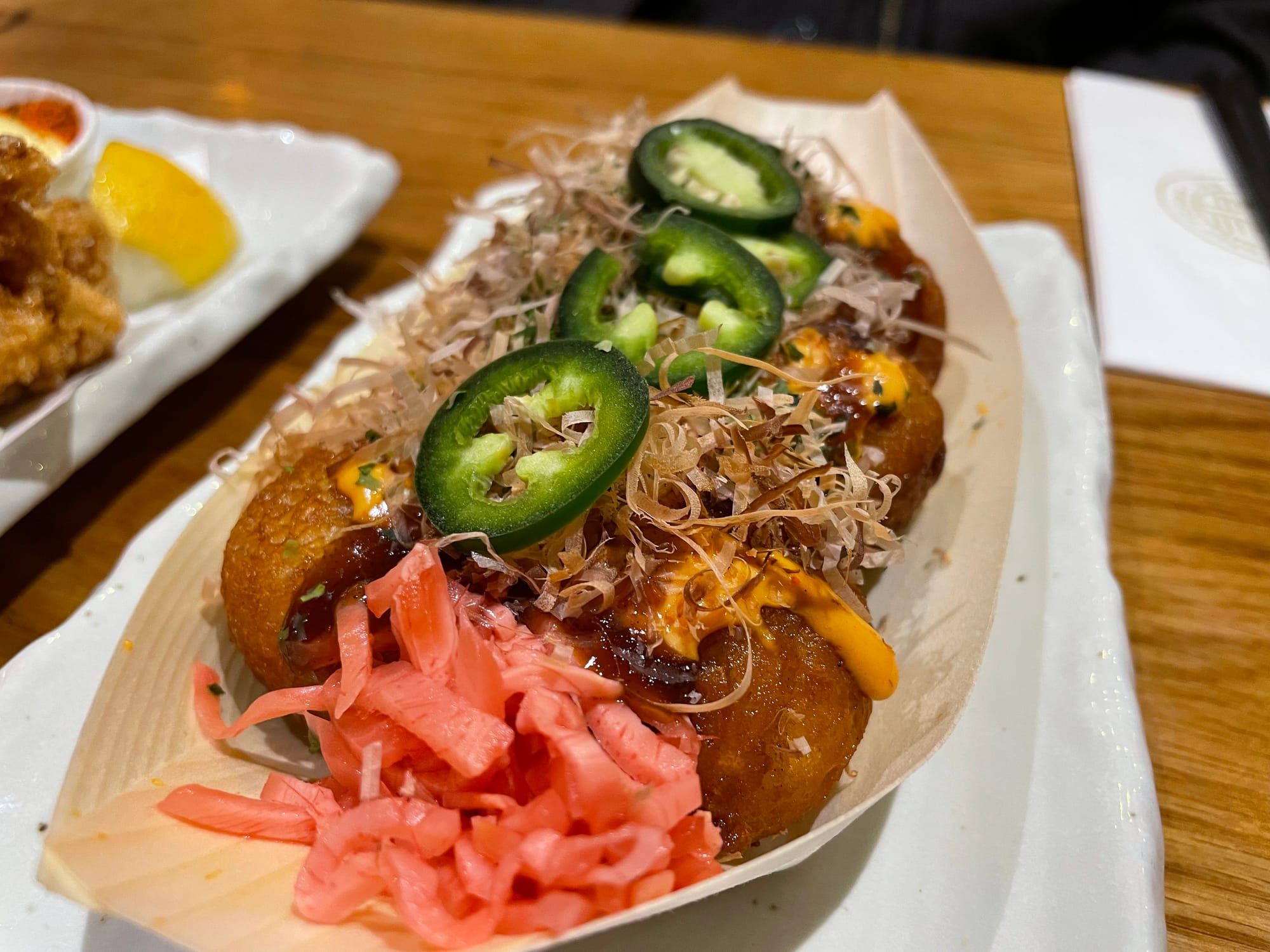
One thing to note on the overall menu is the lacklustre of vegetarian and vegan options. In terms of ramen, they only have one vegan option (White Natural) and in terms of sides their vegetarian options are the Pumpkin Croquette Buns, Edamame, Cucumber and two kinds of Salads. They do have a Pumpkin Croquette Curry, a twist to the traditional Chicken Katsu Curry.

However, even though they’re not a vegetarian based restaurant, a diversification in vegetarian and vegan options would still be appreciated.
For our main meal, we ordered three different ramens. The White Natural (£13.90) which is a spicy vegan ramen, the Miso Tonkotsu Ramen(£14.40) which is a seasonal exclusive, and the Special Miso Wafu Chicken Ramen(£13.90). At first glance, the ramens that we ordered were big in volume, and their toppings were generously added. Each ramen had a very flavourful broth, enriched by a variety of flavours which blended together in harmony.
For sides, we ordered 8pc Takoyaki(£8.50) and a 6pc Chicken Karaage(£8.50). To those who don’t know, Takoyaki is considered a popular street food and snack in Japan. They come in small balls of diced octopus with a slightly crispy batter around it. The Takoyaki ordered from Shoryu was served with a side of pickled ginger which added a nice sharp zest in your mouth, that compliments the warm mellow flavour provided by the Takoyaki. When bitten into, the soft and slightly gooey interior of the Takoyaki melts in your mouth, creating a warm and comforting buzz. The Takoyaki is also garnished with takoyaki sauce and shavings of dried fish called bonito and when dipped in kewpie mayo the flavours really mesh well together - telling of why it is considered a comfort food. Chicken Karaage can be described as Japanese fried chicken and is typically made from the deboned thigh of the chicken - providing a more deep flavour than what you’d get from breast. Served with kewpie mayonnaise and a slice of lemon, the Karaage was tender and juicy on the inside and crispy and light on the outside. Once garnished with some lemon juice, the flavours of the chicken were even more heightened and brought into the spotlight. The Miso Wafu also has Chicken Karaage served as a topping, for those who want a little more of crispy fried chicken!
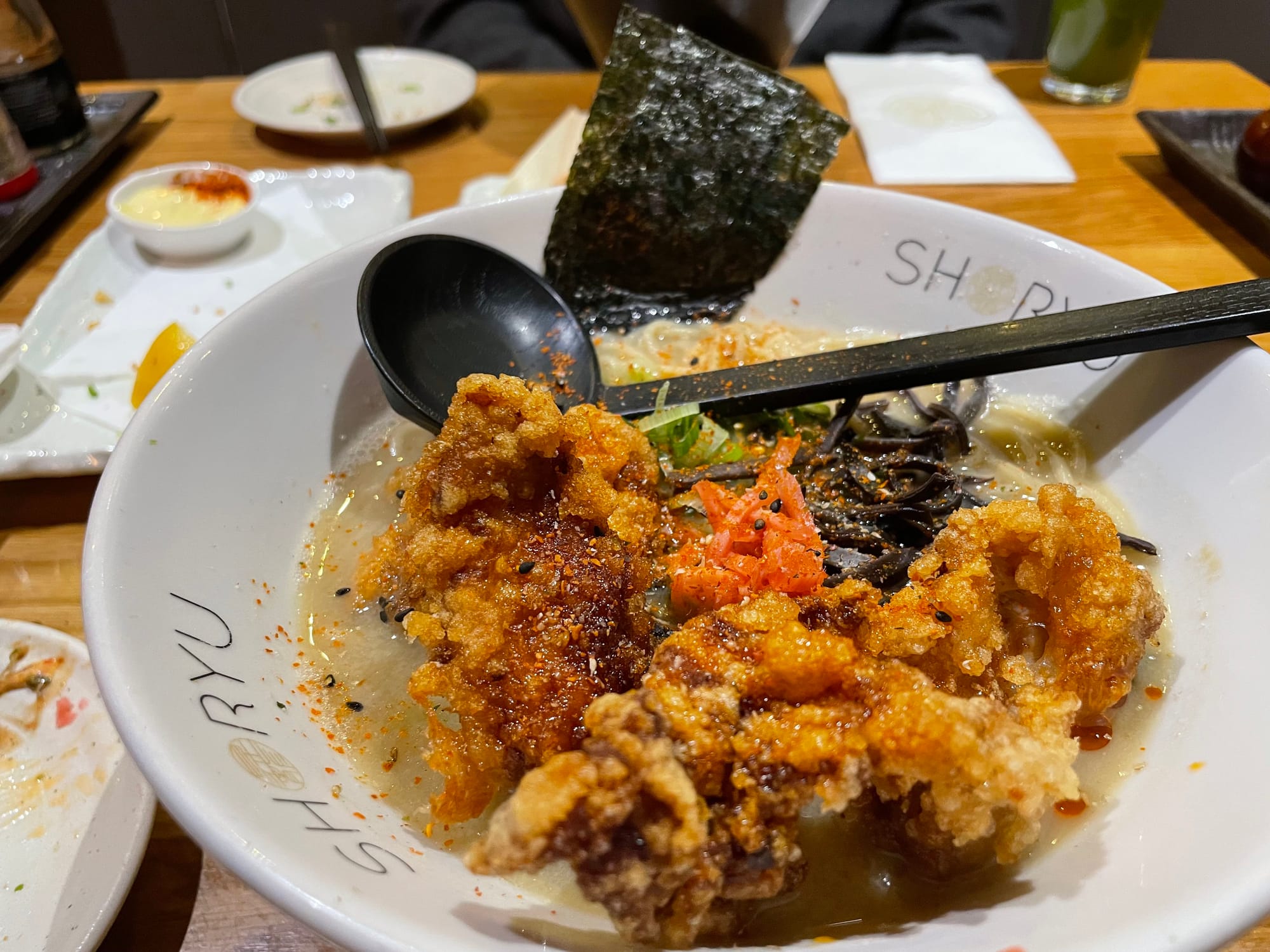
The White Natural, a vegetarian ramen, consisted of a broth made from kombu seaweed and shiitake mushrooms, and it was a very warming and soothing broth. The heat from the broth was much needed on a cold day, and the spice added an extra kick. The broth was complemented with atsuage fried tofu, kikurage mushrooms, menma bamboo shoots and nori seaweed on the side. It also included a very generous serving of ramen noodles. The atsuage fried tofu wasn’t anything special, it tasted like a standard tofu but it did add some nice texture which I appreciated as I do like a good tofu. The sides were firm and slightly crisp but the inside was softer but not too soft that it crumbled in the ramen broth. Menma bamboo shoots had a very interesting taste, and although I’m not a fan of the standalone strong bamboo taste or the rubbery texture, I would be lying if I didn’t acknowledge the flavour it added to the broth without overpowering the other ingredients or having its taste rub onto the ramen itself. Overall it was highly enjoyable, extremely satisfying and for the price you pay, the volume of ramen you get is a great deal.
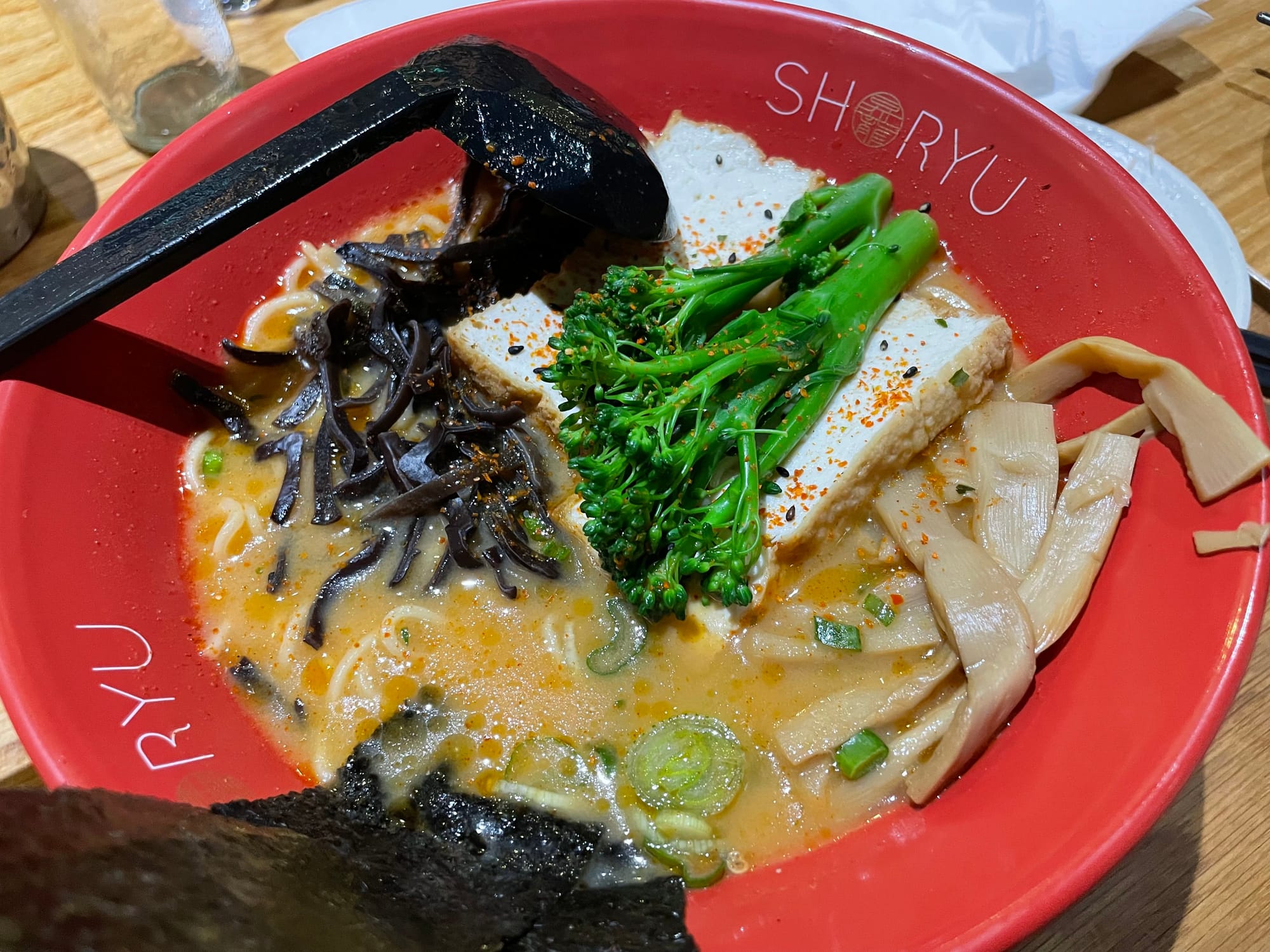
The Miso Wafu Chicken was delicious and flavourful, containing a lot of umami in its broth which is made from a unique tonyu soy milk, white miso, shiitake mushroom and kombu soy combination. The ramen is then topped off with the previously mentioned juicy and crispy chicken karaage, kikurage mushrooms, spring onions, red ginger and nori seaweed. Each topping in the ramen was delicious and provided its own flavour and texture to the dish. Besides the Chicken Karaage (see above, it was juicy and crunchy), the mushrooms were nice and firm, adding another subtle layer of umami to the dish and brought a different texture to the bowl. The ginger once again provided a nice zesty flavour cutting through the built up rich flavour of umami in your mouth and the spring onion provided was subtly placed in the bowl, but had a nice touch of sweetness and zing - bringing the whole dish together. The noodles were once again plentiful and at the right firmness doing a good job in holding and absorbing the broth it was resting in and did not get soggy over time.
The Miso Tonkotsu Ramen is a seasonal exclusive, made with a rich broth of miso and pork soup and garnished with soy marinated braised kakuni pork belly, pak choi, nitamago egg, kikurage mushrooms, spring onion, red ginger and nori seaweed. The pork was nice and soft in texture and tasty and rich in flavour but I found it to be a little bit over marinated for my taste buds - which is just a preference. The noodles were also the same as the other two ramen, the right firmness and good at holding the broth. I found the egg to be timely cooked, providing a subtle gooey softness at its core, adding a nice level of umami into the broth when spilt over. The other garnishes were also well matched with this style of ramen providing different textures and flavours in each bite, keeping you at your toes and stopping you from getting bored of the broth.
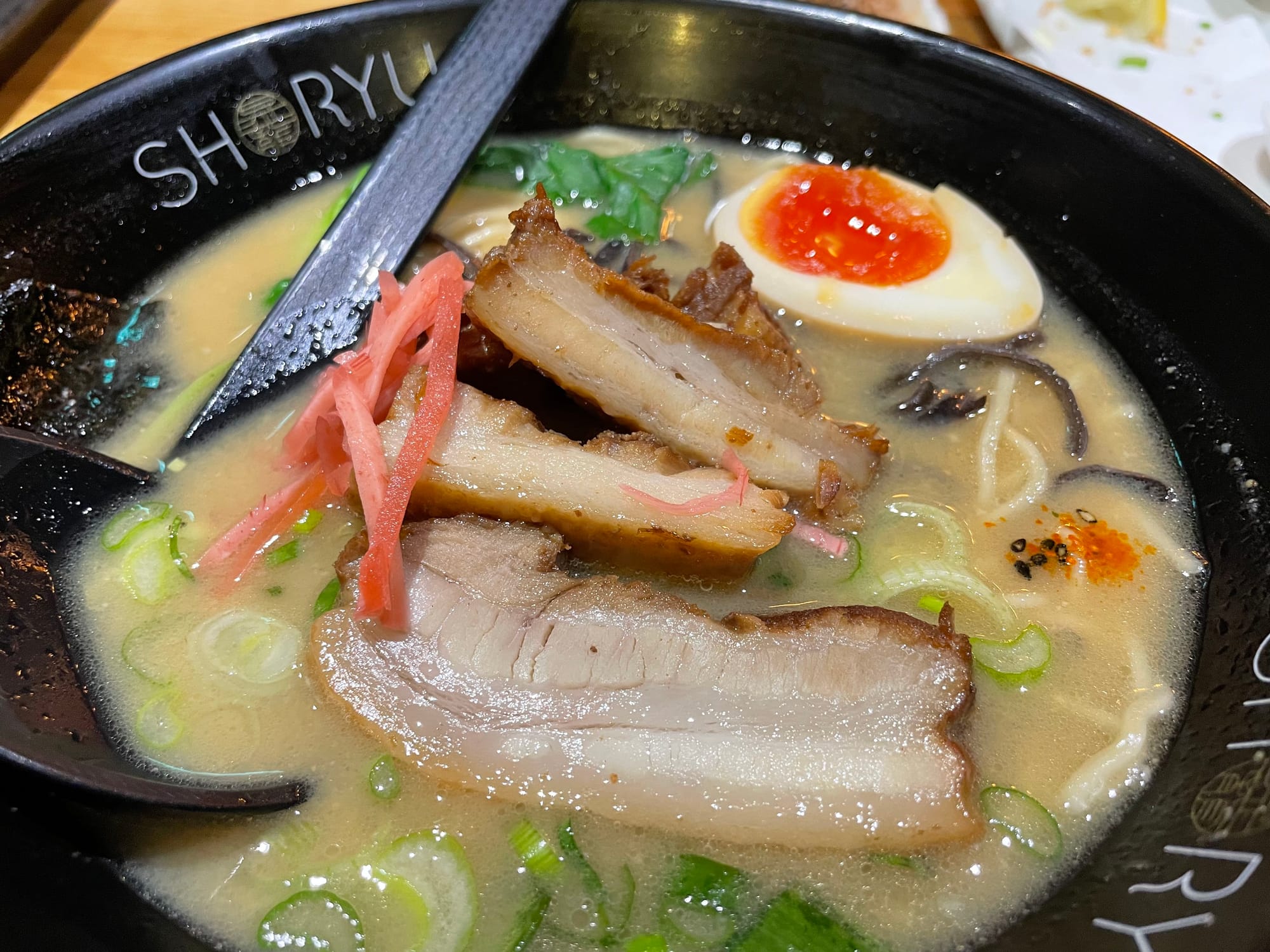
Dessert was a must, especially after a nice flavour-packed and a good value for money ramen dish. The heat from the ramen broths and the sides of Takoyaki and crispy Chicken Karaage, served with Japanese Kewpie mayonnaise called for a cool and sweet ending.
All in all, their dessert selection isn’t the widest, which is understandable as dessert isn’t Shoryu’s speciality. However, we got our hands on some matcha cheesecake, mochi ice-cream (chocolate cookie-dough) and a standard ice-cream with two scoops of chocolate and matcha flavour.
First let’s talk about the Matcha Cheesecake (£5.90), although I’m personally not the biggest fan of matcha, I still wanted to try it out as I’m an avid cheesecake lover. The size you get for the price you pay is a little disappointing. The cheesecake consisted of a very generous amount of matcha filling on top and the crust at the bottom seemed quite stiff and wasn’t much. Regardless, the flavours of the matcha were still present - which I’m sure a matcha lover would appreciate. I also found the filling to be very airy and light, so depending on how you like your cheesecake, this is either good or bad. Personally I think this would’ve gone well with some tea, which Shoryu served as either hot or iced - which I didn’t buy.
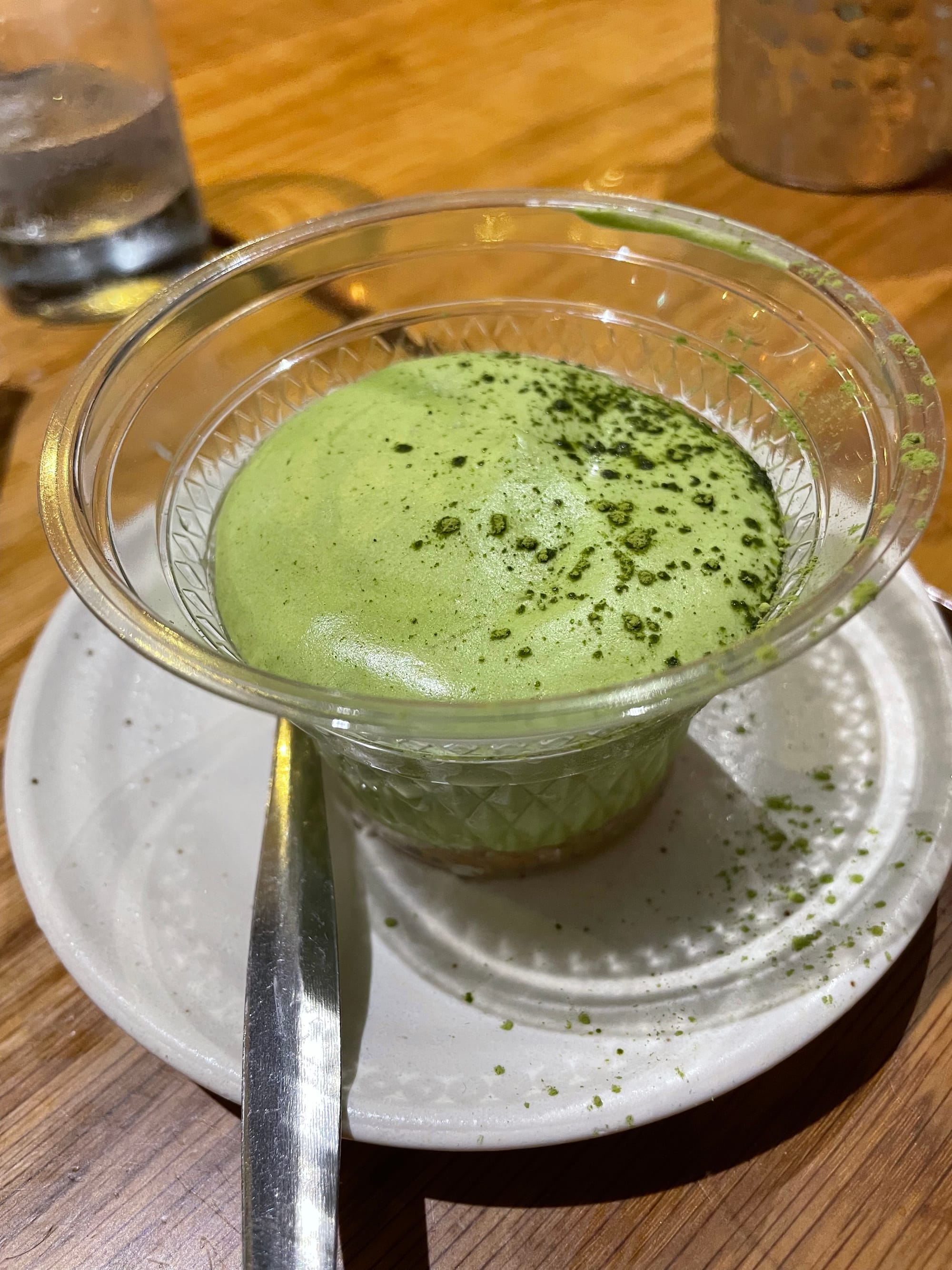
Secondly we had Mochi Ice-cream (£5.50), which reminded me of the ‘Little Moons’ craze last year. I wouldn’t say there is much of a difference between the two, For the flavour, we picked Cookie-Dough. The glutinous rice of the mochi thinly coats the cookie-dough ice-cream, providing a nice chewy texture of a traditional mochi. The chocolatey goodness was definitely mouth-soothing, and the cookie-dough flavour was very apparent as well. I’d definitely recommend this if you buy something extremely spicy, as it was definitely a mouth cooler! Finally, the Ice Cream (£4.60) was nice and standard, not too sweet and the flavours were clear and apparent, go for this if you want to go for something safe and reliable.
To summarise the overall experience at Shoryu, I would definitely say the price you pay for the meal and service is worth it. They have deals like ‘Bun Monday’, a buy-1-get-1-free deal, when you buy any ramen or curry, and ‘Takoyaki Tuesday’ which is the 8pc Takoyaki at half price with any ramen or curry. A 10% student discount is also available here, so make sure you keep that in mind when going, along with an empty stomach as the food is quite filling!
